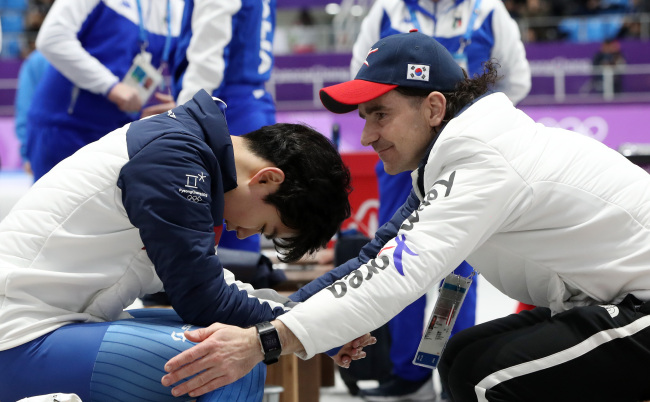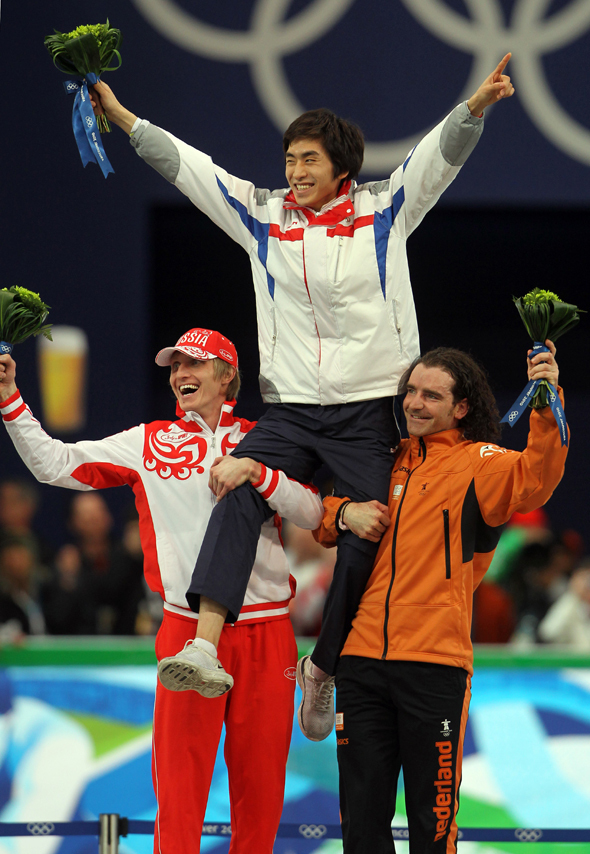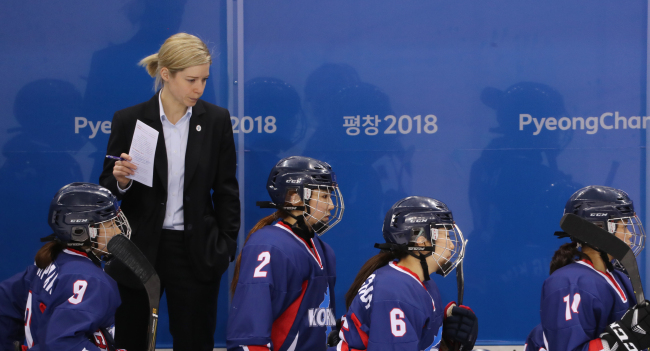[PyeongChang 2018] Hidden faces: coaches behind Korea’s Olympics success
Bob De Jong leads South Korea’s speedskating to medals success; Sarah Murray navigates Olympic debut of first-ever joint Korea team
By Sohn Ji-youngPublished : Feb. 22, 2018 - 16:40
At the PyeongChang Games, South Korea’s athletes have defended their Olympic titles in speed skating and formed the first-ever joint Olympic team in women’s ice hockey with North Korean athletes, among other feats.
While the biggest stars of the Olympics are the athletes themselves and their records, they did not get there on their own. Behind the glory of the Olympic champions are dedicated coaches who have been guiding the athletes in the trenches.
Among them, South Korea owes its success to two coaches in particular: Bob De Jong behind South Korea’s speed skating team and Sarah Murray, the Canadian-American coach heading Korea’s unified women’s ice hockey team.
While the biggest stars of the Olympics are the athletes themselves and their records, they did not get there on their own. Behind the glory of the Olympic champions are dedicated coaches who have been guiding the athletes in the trenches.
Among them, South Korea owes its success to two coaches in particular: Bob De Jong behind South Korea’s speed skating team and Sarah Murray, the Canadian-American coach heading Korea’s unified women’s ice hockey team.

Bob De Jong, speed skating team coach
For years, South Korea’s strongest suit at the Winter Olympics has been long-track speed skating, in which skaters compete in races covering distances ranging from the 1,500 meters to 10,000 meters.
For the first Winter Olympics being held on its home turf, South Korea invited a veteran skater and former rival on the ice to help the country’s athletes defend its Olympic titles and win more medals.
De Jong is a four-time Olympic medalist from the Netherlands. Korea’s speed skating fans may also remember him as the bronze medalist who hoisted up Korea’s Lee Seung-hoon after he won a surprise gold in the men’s 10,000m at the 2010 Vancouver Winter Olympics.

De Jong began coaching Korea’s national speed skating team from May 2017. He decided to accept the offer that had been extended by the Korea Skating Union, after seeing Korea take home five speed skating medals at the Vancouver Games and taking interest in the country’s athletic potential.
The 41-year-old Dutchman has won the 10,000m gold at the 2006 Torino Winter Games, as well as three other Olympic medals. He has also won seven world titles in the 5,000m and 10,000m.
At PyeongChang, the speed skating champion-turned-coach has been spotted alongside the Korean athletes in times of both celebration and consolation. After winning a bronze in the men’s 1,500m race, speed skater Kim Min-seok immediately ran over to his coach to give a heartfelt hug.
De Jong also captured the media attention for being the only figure to comfort Korean speed skater Noh Seon-yeong, who appeared to be shunned by her teammates during and after an unsuccessful run in the 500m team pursuit quarterfinals event.
While the Korean public has been building up anger toward Noh’s two teammates -- Kim Bo-reum and Park Ji-woo -- for potential bullying and lack of team sportsmanship, they have been lauding the Dutch coach for his display of compassion on top of his speed skating expertise and guidance.

Sarah Murray, unified women’s ice hockey team coach
The coach who has had the most tumultuous experience at PyeongChang is undoubtedly Sarah Murray, the coach of Korea’s first-ever unified women’s ice hockey team at the Olympics.
Murray, 29, is a Canadian ice hockey player and the daughter of a former NHL player. She began her coaching career four years ago, by taking up the task of heading South Korea’s fledgling women’s ice hockey team through their Olympic debut at the PyeongChang Winter Games.
Shortly before the team’s Olympic debut, political negotiations turned Murray’s team into something that goes far beyond mere sports.
North Korea was to participate in the PyeongChang Games, and it would form a joint team in women’s ice hockey combining players from the North and South.
This meant that Murray had to work with an entirely new team dynamic and change the team’s strategy and lineup agenda with less than a month left until the Olympics. Some South Korean players would have to be excluded to make room for the North Korean athletes.
Moreover, the world was scrutinizing every move by the joint ice hockey team, which now carried heavy diplomatic weight for inter-Korean relations.
Though the unified Korea team ended its Olympic run without winning a single matchup, the score was beside the point for the coach, the team members and everyone watching them.

“This situation that we were in was out of our control. And we did a great job in the situation. The players were great,” she said in her reflections during a press conference held at Gangneung on Wednesday.
“Initially when I heard that the North was coming, I was a little bit resistant to it. But once they came and they got on the ice with our players, they were competitive, they wanted to play, they wanted to learn,” Murray said in her reflections during a press conference Wednesday.
Having concluded its final match, the joint Korea team’s Olympic run is now over. However, Murray is not ready to leave yet. She will continue to coach the South Korean team for at least two more years.
“I have been asked to extend my contract for two more years, and I’ve accepted. I don’t want to just be here with this team for the Olympics. We’ve been through so much over the last four years and we’ve improved dramatically,” Murray said.
She hopes to help the team train for the Ice Hockey World Championships and bring them one step closer to competing at the next Winter Olympics in Beijing in 2022.
By Sohn Ji-young (jys@heraldcorp.com)







![[Graphic News] More Koreans say they plan long-distance trips this year](http://res.heraldm.com/phpwas/restmb_idxmake.php?idx=644&simg=/content/image/2024/04/17/20240417050828_0.gif&u=)
![[KH Explains] Hyundai's full hybrid edge to pay off amid slow transition to pure EVs](http://res.heraldm.com/phpwas/restmb_idxmake.php?idx=644&simg=/content/image/2024/04/18/20240418050645_0.jpg&u=20240419100350)





![[From the Scene] Monks, Buddhists hail return of remains of Buddhas](http://res.heraldm.com/phpwas/restmb_idxmake.php?idx=652&simg=/content/image/2024/04/19/20240419050617_0.jpg&u=20240419175937)

![[KH Explains] Hyundai's full hybrid edge to pay off amid slow transition to pure EVs](http://res.heraldm.com/phpwas/restmb_idxmake.php?idx=652&simg=/content/image/2024/04/18/20240418050645_0.jpg&u=20240419100350)

![[Today’s K-pop] Illit drops debut single remix](http://res.heraldm.com/phpwas/restmb_idxmake.php?idx=642&simg=/content/image/2024/04/19/20240419050612_0.jpg&u=)